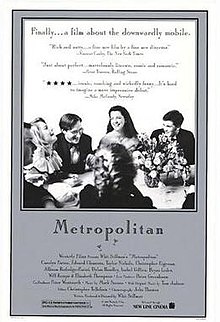Metropolitan (1990 film)
| Metropolitan | |
|---|---|

Promotional poster for Metropolitan
|
|
| Directed by | Whit Stillman |
| Produced by | Whit Stillman |
| Written by | Whit Stillman |
| Starring |
|
| Music by | Jock Davis Tom Judson Mark Suozzo |
| Cinematography | John Thomas |
| Edited by | Christopher Tellefsen |
| Distributed by | New Line Cinema |
|
Release date
|
|
|
Running time
|
98 minutes |
| Country | United States |
| Language | English |
| Budget | $225,000 |
| Box office | $2,938,208 (USA) |
Metropolitan is the debut film by director and screenwriter Whit Stillman. It received an Oscar nomination for Best Original Screenplay. The film is often considered the first of a trilogy of Stillman films, followed by Barcelona (1994, but written before Metropolitan) and The Last Days of Disco (1998).
Shot on location in Manhattan and Long Island, the film depicts the lives of young, well-educated upper-class New Yorkers (or, as one character calls them, the "urban haute bourgeoisie") home on winter break from their first year of college during debutante ball season.
Middle-class Princeton student Tom Townsend, an admirer of Charles Fourier's socialism, attends a dress ball one evening on a whim. After the ball, a mix-up leads to his meeting a small group of young Upper East Side socialites known as the Sally Fowler Rat Pack, after the girl whose apartment they use for after-hours parties. Believing that they accidentally stole a taxi from Tom, they decide to invite him to their after-hours party, to prevent ill feelings.
Tom decides to attend the party, and befriends several other attendees, including Nick Smith, a cynical dandy who takes Tom under his wing; Audrey, a shy girl who enjoys Regency era literature and has a crush on Tom; and Charlie, an overly philosophical nerd with an unrequited love for Audrey. Tom learns that he and the Rat Pack have some common friends, including his ex-girlfriend Serena Slocumb, with whom he remains infatuated.
Under Nick's tutelage, Tom ingratiates himself to the Rat Pack and soon becomes a full-fledged member. Much of the film is composed of dialogues in which Tom and the Rat Pack discuss the nebulous social scene they occupy, including how they are coming of age just as the yuppie culture in which they were raised is ending, leaving them with uncertain social futures. During these discussions, Tom reveals that he, too, was raised wealthy, but that his father abandoned the family to marry another woman, leaving Tom and his mother with limited financial resources. As a result, Tom harbors a love-hate relationship with wealth and the upper class.
...
Wikipedia
